Features
By Dr Kate Orkin
COVID-19 and the related government-led lockdowns have resulted in widespread economic shock and job loss, in the UK and around the world. Governments, including in low and middle-income countries, have responded with economic interventions to cushion the shock. The most widely-used government tool has been cash transfer programmes: the World Bank finds 234 measures involving expanding cash transfer programmes worldwide, as well as 100 food or voucher schemes.
In the past, some governments have been concerned that transfers would increase dependency on the state and, in particular, that cash transfers would not be used well because it is hard to monitor how people spend them. Many governments used instead to provide food aid or subsidise basic food items.
So why have governments shifted to using cash in low and middle-income countries?
Why have governments shifted to using cash in low and middle-income countries?
In most situations, there is strong evidence that money, not food, is the most efficient and effective way to distribute emergency aid and social programmes. This particular question, on how poor people use cash transfers, is one of the most studied in development economics.
The finance ministry in Mexico did one of the first conditional cash schemes in 1997. To evaluate the programme, they ran a randomised trial. They could not roll out the programme all at once, so they randomly selected some communities to receive it first and compared them to those who did not. This is a similar process to how drugs are tested, but with a social programme. Since then, many countries' governments in low and middle income countries have implemented similar studies.
In most situations, there is strong evidence that money, not food, is the most efficient and effective way to distribute emergency aid and social programmes.
Poor people spend cash grants well. The bulk of transfers are spent on food anyway. For example, a review of 165 studies by the Overseas Development Institute found that recipients of cash grants have better dietary diversity and are less likely to face food insecurity. A World Bank review found grants improve growth and cognitive development in small children. Cash also has the added benefit of giving people autonomy to spend on what they need most. It also stops distortions arising in local markets, where bringing in free food can lead to price decreases that hurt local producers.
Poor people spend cash grants well
Emergency, fast cash is a smart investment in long-term poverty alleviation
Numerous studies, from China and India to Ethiopia and Malawi show that economic shocks have severe long-term consequences. Poor households often take short-term decisions that leave them in deeper long-term poverty. The decision most feared is that households reduce children’s nutritional intake.
Setting aside moral arguments, malnourished children have lower schooling attainment and lower earnings throughout their lives. A World Bank review found grants improve growth and cognitive development and later outcomes in small children. It is harder to find a smarter investment.
When households face economic shocks, women may enter into transactional sexual relationships: during the outbreak in West Africa, a study by anti-poverty organisation BRAC found young women had older partners, higher rates of pregnancy and did not return to school. Both responses to poverty could be mitigated by cash transfers.
But studies also show that, when facing a short deep shock, desperate households often sell productive assets such as cows, vehicles or phones or dip into meagre savings which they usually use to search for work. Losing the means of earning can lead to many additional years of poverty. Temporary cash grants can help. Studies in Bangladesh and Malawi found recipients of grants are less likely to sell assets when they face shocks.
There are anecdotes of welfare queens: people spending their welfare money poorly. But the anecdotes just do not bear out the reality
In low and middle income country settings, cash transfers also mostly do not affect whether, or how much, people work. In some studies they increase job search because they give people money for transport costs and airtime. For example, one South African study found youngsters in households with a pension recipient are more likely to find jobs.
There are anecdotes of welfare queens: people spending their welfare money poorly. But the anecdotes just do not bear out the reality in large samples of people. There is really no good evidence of waste. A review of 19 studies by the World Bank found cash grant recipients did not increase spending on alcohol or cigarettes. In some countries, which only give the grants to parents, there have been arguments that the grants are incentives for women to have children. But there is little rigorous evidence of this. For example, trials in Nicaragua and Malawi found that women in households are less likely to fall pregnant; a trial in Mexico found no effects.
An increase in cash grants may also help stimulate the economy. In a trial in Kenya, the NGO GiveDirectly evaluated an intervention which gave the poorest people, in some randomly selected villages, large lump-sum cash transfers. They found that people living near to villages, where the poorest received cash transfers, also had higher food consumption, partly because recipients spent money in their businesses. There were no meaningful inflationary effects.
Most striking of all, the study estimates a ‘fiscal multiplier’ of 2.6 for this area of Kenya, implying that every $1 invested in fiscal stimulus will grow the local economy by $2.60. That is even larger than in such multipliers the US during a recession. These were much, much bigger transfers than most governments in poor countries give out, equivalent to about $1,800, if spent in the US. So we do not know if the same effects occur from smaller transfers, but in principle the mechanism might work in the same way.
Cash is also usually cheaper to distribute than food. It can often be transferred to bank accounts or mobile money accounts. It does not go off
Cash is also usually cheaper to distribute than food. It can often be transferred to bank accounts or mobile money accounts. It does not go off, and governments don’t have to worry about having the wrong type of cash in the wrong place. There are worries that cash might be more fungible and possible to divert, but there is also evidence on how to prevent ‘leakage’, in particular by paying directly to beneficiaries, requiring biometric identity verification and being very clear about who is getting what benefits on what schedule. It is obviously difficult to set these systems up from scratch, but many countries have them in place already. And cash is much better for social distancing than food parcel queues, if it can be sent to bank accounts.
There can be cases where food aid makes more sense, for example if there is disruption to the food supply chain or if prices go up rapidly. Sometimes beneficiaries say they prefer food. But in general, it is fair to say that a cash system can work better than a food system.
South Africa is an interesting recent example. They had an emergency food parcel system before the crisis and it got completely overwhelmed. They just could not scale up fast enough to reach everyone who needed it. The authorities eventually admitted that the food parcel system was not working, so instead they increased the amount of their pension and child grant, where people were signed up already. They have also added a new cash grant for the unemployed.
Dr Orkin is a labour economist at the Blavatnik School of Government, University of Oxford
Robert Burton was a scholar at the University of Oxford 400 years ago. He drew on the collections of the Bodleian Library and Christ Church, where he was himself Librarian, to seek to understand the human condition, in its full emotional range.
But his declared subject was 'melancholy'. The Anatomy of Melancholy, first published in 1621, is an extraordinary and enormous attempt to grapple with the causes, symptoms, and treatments of that universal human experience.
Four hundred years later, when clinical depression is stated to be the leading cause of global disability, and there are many challenges to our mental health, a new radio series for BBC Radio 4 is asking: how far have we come? And is there anything we can learn from Burton’s Anatomy of Melancholy to help us today?
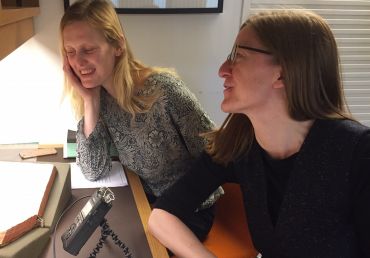 Amy Liptrot and Kathryn Murphy at the Bodleian Library
Amy Liptrot and Kathryn Murphy at the Bodleian LibraryWith Burton as a guide, the series hears from leading experts in mental health research today, and from those who manage their struggles with sadness and depression in a variety of ways - including the gardener and broadcaster, Monty Don, pioneering cell biologist and author of Malignant Sadness: the anatomy of depression, Lewis Wolpert, and a young survivor from the Manchester Arena attack.
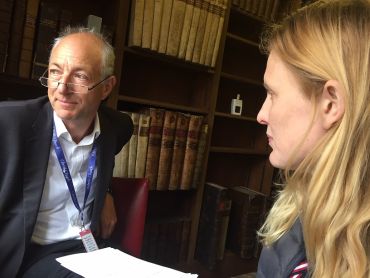 John Geddes and Amy Liptrot at Christ Church
John Geddes and Amy Liptrot at Christ Church
Each episode takes on a different theme from Burton's Anatomy, covering causes such as: genetics ('an hereditary cause'), inflammation ('inflammations of the head'), inequality ('poverty and want'), trauma ('terrors in the night') and possible 'cures' such as nature, 'merry company', ‘divine music’, sleep, friends, exercise.
 Bust of Robert Burton at Christ Church Cathedral
Bust of Robert Burton at Christ Church Cathedral‘We've explored the part of melancholy in the human condition, how it can be alleviated and lived with - and the unique voice of Burton has been a brilliant guide though it all.’
The series shines a light on common experiences and connections over time and the ways in which science is catching up with the intuitions and understanding from 400 years ago and beyond.
Robert Burton talks about his own struggles with melancholy and reveals a personal vulnerability when he says: 'I write of melancholy, by being busy to avoid melancholy.' The series explores the potential of writing and reading to give purpose, better understand one's experiences and connect with others. Perhaps there has never been a better moment to pause and reflect on melancholy: ways to understand it, alleviate it and accept it.
The actor Simon Russell Beale narrates sections of Robert Burton’s text throughout the series.
Professor John Geddes is series consultant for The New Anatomy of Melancholy.
Dr Kathryn Murphy’s book Robert Burton: A Vital Melancholy will be published in 2021.
The Bodleian Library is curating an exhibition based around The Anatomy of Melancholy, due to open in the autumn, 2021.
The 10-part series The New Anatomy of Melancholy begins on BBC Radio 4, Monday 11 May 2020 at 1.45pm.
Listen here: https://www.bbc.co.uk/programmes/m000j1jq
Research at Oxford has shown music brings people together and makes them feel better - and social distancing has provided overwhelming support for such academic music theories.
To celebrate music of the lockdown, Oxford’s music faculty is today inviting entries for a unique competition focusing on safe collaboration, networking and virtual collectivity
To celebrate music of the lockdown, Oxford’s music faculty is today inviting entries for a unique competition focusing on safe collaboration, networking and virtual collectivity. At the same time, Oxford music students are giving an online performance tonight [24 April] for the YoungDementia UK charity.
The EMPRES Award 2020 invites creative, collaborative responses to the global challenge, of making music and art during the Covid-19 pandemic. Entries can come from any member of the University of Oxford and their creative associates. This could include filmmakers, writers, visual artists, composers and musicians.
Meanwhile, Oxford musicians became involved with the Oxfordshire-based charity as part of the Turtle Song project. The aims is to reach out to people with dementia and engage with them socially and creatively. Music is proven to be of great physical and emotional benefit to people living with dementia.
The work was cut short by the lockdown. But the whole group, include those living with dementia, came together by Zoom last Friday and hope to ‘meet’ regularly during this difficult time. According Turtle Song project director Carolyn von Stumm: ‘The joy at the group being reunited as we all sang and danced in our living rooms was palpable. A wonderfully, uplifting, positive story with a very human perspective.’
Oxford music students are giving an online performance tonight [24 April] for the YoungDementia UK charity
Will Prior, an Oxford music student who has been involved with the project, says: ‘Volunteering...has been eye opening and inspirational in equal parts....it is a great shame that we were not able to meet as a group in person for the (final performance) we have found a way, through the wonder of Zoom, to connect with each other...Although the social dynamic is vastly altered...there’s something rather special about seeing a group of people...dancing round their living rooms without a care in the world whilst belting out...songs that you wrote together.’
The EMPRES competition is also aimed at engaging people with music during these challenging times. The Music faculty’s electronic music studio manager and EMPRES artistic director, Daniel Hulme, comments: 'We are living through times inconceivable just a few months ago, that will no doubt resonate for many years to come. This is both an extraordinary crisis, and potentially an extraordinary stimulus to do something remarkable.'
This is both an extraordinary crisis, and potentially an extraordinary stimulus to do something remarkable
The deadline for submissions is Monday 15 June. There are two broad categories:
- Experimental Electronic Music and
- Sound Art.
Submissions in both categories are welcomed from collaborations with other artists, researchers and disciplines. There will be prizes in both categories and online publication – with a live performance of selected works later in the year. A key requirement is that the works are deliverable within the current UK guidelines around social distancing – and could include a digital experience or a web-based installation. And they must be no longer than eight minutes.
Submissions for the EMPRES, Electronic Music Research, competition should be sent via WeTransfer (or another web transfer service) in a single ZIP file to [email protected].
Turtle Song has run 28 projects throughout the UK over the last 11 years, involving 800 participants, 150 music students and 10 universities and music colleges. You can see their performances at https://www.turtlekeyarts.org.uk/turtle-song.
By Charvy Narain
Much has changed since the beginning of the year, when University of Oxford researchers first started coming together to fight the novel coronavirus outbreak. But what has remained consistent is that the University of Oxford remains at the forefront of global efforts to combat the SARS-CoV-2 virus and mitigate its many effects: medical students have been stepping up, researchers with clinical skills are returning to front-line clinical roles, and others are offering up equipment and materials, as well as their laboratory skills to help the NHS respond to the crisis.
The University is also working directly with Oxford University Hospitals NHS Foundation Trust to reduce clinical research activity, and instead prioritising research on COVID-19.
Immunity as the key
One such researcher is Professor Tao Dong, a Professor of Immunology at the University, as well as the Oxford Director of the Chinese Academy of Medical Sciences Oxford Institute (COI). The Institute, a collaboration between the University of Oxford and the Chinese Academy of Medical Sciences, has turned out to be particularly well-placed to respond to the coronavirus crisis: its main aim is to deliver innovative ways of managing cancer as well as infectious diseases, and it has close links to clinicians as well as researchers in China.
Professor Dong says: ‘We started prioritising research on COVID-19 back in January 2020. In March, the COI has already provided funding to seven separate research projects unpicking the immunobiology of the SARS-CoV-2 virus, helping Oxford-affiliated researchers to get research started at record speed.’
Professor Dong’s own research group is currently testing samples taken from COVID-19 positive patients in hospital, taken at different time points in their illness. She says: ‘Some people with a COVID-19 infection are able to fight it off successfully, while others get really ill. We are analysing immune markers in patients to see if we can identify markers that predict how a patient is going to respond, and also to identify targets for drugs to make things better.’
Professor Dong does think that understanding the immune response to COVID-19 is going to be key to defeating it. She says: The immune response to this novel coronavirus is quite unusual. Some of the immune responses it appears to be triggering may actually be making things worse, and if we can predict who is going to respond this way, or even better, find ways to change it, we might be able to help patients.’
Vaccine
The immune system is also the focus of the Oxford Vaccine Group and the Jenner Institute, who are veterans when it comes to combating epidemics: in 2014, the Oxford team helped develop a vaccine for the Ebola epidemic in West Africa. The team are about to start trials in healthy young volunteers in the Thames Valley region, to test the new ChAdOx1 nCoV-19 vaccine.
The new vaccine is already in production but not ready yet. Dr Sandy Douglas, who is leading on the vaccine manufacturing scale-up project, says: ‘The scale of this epidemic poses a huge challenge for vaccine manufacturing. We need to follow rigorous safety standards and that takes time. By starting work on large-scale manufacturing immediately, we hope to accelerate the availability of a high quality, safe vaccine.’
Technology to the rescue
Large-scale usage would also be the key to the success of a mobile contact tracing app, developed by researchers at the Big Data Institute, Nuffield Department of Medicine, that could potentially help slow COVID-19 infection rates, and support countries to emerge from lockdowns safely. But civil liberty issues and ethics were also central to this proposal: researchers from the Wellcome Centre for Ethics and Humanities at Oxford University co-authored this study, and point out that both ethical oversight and public and user engagement would be essential to the app’s potential success.
The idea of an app is one of many emerging at break-neck speed as researchers focus their combined efforts to combat COVID-19.
Looking to the future
Some researchers are looking at what happens to COVID-19 patients over the longer term: Dr Betty Raman says: ‘We know from the previous SARS epidemic that coronavirus infections can have long-term effects on lung function, exercise capacity and quality of life. Tracking the long term effects of SARS-COV-2 may therefore be important and could highlight the need for ongoing medical surveillance and follow-up.’
Recent studies suggest that COVID-19 can affect other organs besides the lungs. So together with Professor Stefan Neubauer, Dr Raman is leading the C-MORE study, which assesses the effects of COVID-19 on multiple vital organs including the lungs, heart, brain, liver and kidneys (as assessed by magnetic resonance imaging) for up to twelve months. The study will also explore the impact of COVID-19 on functional capacity and quality of life for people who are affected by the illness.
Professor Neubauer said: ‘This research will be important to understand the long-term impact of SARS-COV-2 infection on a holistic level. The results will be important to assess the long-term consequences for healthcare resource planning and to guide development of new therapies.’
These researchers are also collaborating with others at Oxford, including Professors Clare McKay and Peter Jezzard at the Wellcome Centre for Integrative Neuroscience, to assess the impact of SAR-COV-2 on neurological and mental health, along with infectious diseases experts (such as Professor Brian Angus) and others.
Mental health
Researchers at the Departments of Experimental Psychology and Psychiatry are looking at the longer term, and have launched a study to track young people’s and children’s mental health through the COVID-19 crisis. The study came together in record time. Dr Polly Waite, who is co-leading the study, said: ‘Schools closed in the UK on Friday 20th March, we had the idea for the study on Sunday 22nd March, and we had the survey out on following Monday, on 30th March.’
Dr Waite is a working clinical psychologist, and her research is usually focussed on managing anxiety in young people known to have anxiety disorders. “But the closure of schools and nearly all families having to stay at home is quite unprecedented, and we know that many young people already struggle with general anxiety, depression and OCD,” says Dr Waite. So the survey aims to identify what factors might protect children and young people from worsening mental health, what particular stress points there might be, and how this might vary according to factors specific to the child and family.
Professor Cathy Cresswell, the study’s other co-leader, says, “We hope to have more than 10,000 parents and carers across the UK complete the new online survey. Their responses will help us really understand how families are coping and what support could make all the difference to children, young people and their families at this time.”
The research team hope to track families over the next twelve months, including when children might return to school. “That may bring a whole new set of challenges for a family, but children are generally quite resilient,” says Dr Waite. “But again, what we want to do is try and track why and how some children have an easier time readjusting compared to others.”
Parents resource
In collaboration with the World Health Organization and UNICEF, the University of Oxford has also launched a parenting resource for self-isolating families.
One Oxford
During this challenging time, some of the world’s brightest minds are coming together, working in unprecedented ways to deliver world class research with global benefits and to make an impact on the frontline of this crisis. Oxford is made of its people, and these achievements are a result of contributions on all levels as we continue to face this global challenge, together.
Find out more about the University of Oxford’s coronavirus research.
Professor Louise Richardson, Vice-Chancellor of the University of Oxford, explores the international response to Covid-19 and the role of universities, who are working with colleagues across the globe to understand the disease and protect our communities.
(An edited version of this article appeared in Foreign Affairs on 9 April 2020)
One of the very many disheartening aspects of the Covid-19 pandemic is the near absence of international institutions in fashioning a response to this global crisis. The G7 could not agree a statement and the G 20 could only agree that the problem was both global and serious. Disease, like other grave threats to the world today, most notably climate change, does not respect national borders and yet the response has tended to be a nationalist one. It is precisely at times like this that we need strong international institutions who will share information, insist on reliable information - and have the courage to call out those not providing accurate information – and who will ensure that the poorest countries and their populations are not forgotten in the rush for an effective response. The WHO has been the only international institution in evidence throughout the crisis.
It is striking that while the US, the UK, and other countries are committing eye-watering sums to tackling the pandemic and mitigating the impact on their population and their economy, the amount of funding committed to the developing world is derisory. Countries in Africa are not yet indicating large numbers of cases but that is only because they do not have the means to test and we know their health care systems are seriously under resourced at the best of times.
That this pandemic occurred at all, of course, reflects a failure of international institutions and national governments too. We have had warnings. The SARS epidemic of 2002-04 was believed to have begun in an Asian wet market. The current coronavirus is believed to have begun in a wet market in Wuhan, and reports are that as China returns to normal, wet markets are again emerging in the poorest districts of some Chinese cities. The Ebola crisis should have served as a warning too but that involved people dying far away from the wealthy streets of the west and the lessons were ignored.
There was no shortage of people pointing to our vulnerability to a pandemic, and they were not all obscure academics, just see Bill Gates’ TED talk of 2015 in which he contrasted the vast sums spent on nuclear deterrence to the paltry sums spend on pandemic preparedness. Governments have preferred to see security in military terms, epaulettes never stethoscopes. Production of vital pharmaceuticals were outsourced to the cheapest providers, generally China and India, all in the name of private profit and public economy.
We seem to have come full circle. Globalisation, which brought enormous wealth to many parts of the world, led to gross inequalities in the distribution of it benefits. Those who lost out took their revenge at the ballot box and elected leaders the world over on a populist tide. These leaders, in turn, showed only distain for the constraints imposed by international institutions and unilateralism reigned. Now we all face a global crisis which requires international co-operation, but the mechanisms for delivering it have been weakened.
Far below the haute politique of international relations there are global institutions in the trenches that are working to find a vaccine, develop effective therapeutics and use technology to design treatments and expedite mass production. They are working together with colleagues from around the world, including the global south. They are, of course, universities.
I can speak only to the work of my own university, The University of Oxford. But there are a great many other universities around the world in which international teams of talented and committed researchers are working around the clock to find a cure for, and mitigate the impact of, Covid 19.
While the medieval streets of Oxford are deserted some of our labs are buzzing. We have an estimated 500 researchers, assisted by an equal number of technicians and support staff, who are engaged in Coronavirus related research. We also have large teams around the world, in Thailand, Vietnam and Kenya who are working with local collaborators, as they have done for years, seeking to build local capacity and to understand and to counter respiratory and other diseases.
The University of Oxford has been around so long we don’t quite know how long, but between eight and nine hundred years. We have lasted as long as we have because of the enduring value of what we do: push at the frontiers of knowledge, educate the next generation, and contribute to the world around us. The growth of the University accelerated after 1169 when Henry II banned English scholars from travelling to the University of Paris. Efforts to constrain the free flow of ideas have never worked and Universities have thrived precisely because of our ability to recruit scholars from anywhere and everywhere who want to engage with one another. Just two months ago my biggest challenge was responding to the constraints Brexit might pose on our ability to recruit globally. Today that challenge pales into insignificance in the face of the enormous financial and operational challenges posed by this pandemic.
While we are responding to the challenges presented, we take enormous pride in the work of our academics, medics and researchers. These scholars, from all over the world, are not driven by individualistic competition for plaudits, profits or political advantage but rather by the age old mission of contributing to the world around us.
Here in Oxford a team at the Jenner Institute led by Professor Sarah Gilbert, that had previously worked on a vaccine for MERS, has identified a non-replicating viral vector vaccine candidate: ChAdOx1 nCoV. GMP manufacturing at the Clinical Biomanufacturing Facility in Oxford is in progress. Recruitment for human participants has begun with plans for first-in-man testing by April 22nd. This is an international effort with plans for large-scale production in Italy, India and China. Simultaneously the vaccine is being tested for protections against disease and the absence of any adverse effects in animal models in Rocky Mountain Labs in the US and Porton Down in the UK. We believe this to be the only vaccine candidate aiming for efficacy in humans by late June.
In addition to working on a vaccine our researchers are developing and repurposing drugs, predicting future outbreaks, informing public health, developing diagnostic tools and understanding behaviours and the resulting social impact.
Professor Peter Horby, who led the University’s work in response to SARS when he was Director of the Oxford University Clinical Research Unit in Hanoi, Vietnam and later led our response to Ebola, has been contributing to the response in Wuhan since early January, including the first randomised controlled trials of anti-viral drugs. He and other colleagues have been collaborating with the Chinese Academy of Medical Sciences and the China Centre for Disease Control throughout the crisis. In the UK he and other Oxford researchers have launched a national clinical trial to test the effectiveness of the HIV drug lopinavir-ritonavir and the steroid dexamethasone in the treatment of Covid 19 patients. Meanwhile Professor Guy Thwaites is conducting a clinical trial of chloroquine for the treatment of Covis-19 in Vietnam, in close collaboration with the Vietnam Ministry of Health.
Medics in our overseas programmes have been working on respiratory diseases for a long time. Our team in Thailand, led by Professor Nick Day and working with colleagues in the Mahidol Oxford Tropical Medicine Research Unit which, like our other oversees programmes, is funded by the Wellcome Trust, is conducting large scale multinational clinical trials. They are currently conducting a trial of chloroquine/hydroxchloroquine for the prevention of Covid-19 in healthcare workers, with planned sites in Thailand, Vietnam, Laos, Italy and the UK. They have also simulated and advised on chloroquine dosing for the WHO-led multi-centre study. The environment for scientific studies on these drugs has been difficult ever since President Trump promoted them as a cure for Covid-19. The Indian government has now recommended hydroxychloroquine as prophylaxis for health workers without evidence of its benefit, so a randomised trial cannot be conducted. Publicity around the benefits of the drug has also led to fatalities as individuals treat themselves and accidentally overdose. In addition to clinical trials our teams in Thailand are modelling the out-break of Covid-19 in Asia and working on optimising critical care in low resource settings.
Oxford academics have been based at the KEMRI Wellcome Research Programme - where there are 850 employees - for over 25 years. They work across three main hubs in Kenya and Uganda; Nairobi, Kilifi and Mbale with further international reach through collaborating sites. Led by Professor Philip Bejon, KEMRI-Wellcome site has been at the forefront of developing vaccines for Malaria. Currently they are one of three sites in the country testing for Covid 19. They have worked on a long list of vaccines and conducted phase 1 Ebola trials as well as early stage trials of Rift Valley Fever and Yellow fever.
Their modelling group has spent almost 15 years working on respiratory viruses in Kenya. As such they understand the pattern of contacts. So that if a healthy male in a rural Kenyan homestead gets a disease they have the data to know how many people he will have been in contact with. In the words of Professor Bejon: “You can’t decide to start doing these things when the crisis strikes, you have to be there already.” As a result of a programme of capacity building over many years most of the programmes are led by impressive Kenyan scientists. The KEMRI-Wellcome team are keen to work with colleagues in the Jenner Institute in Oxford so that they can test the vaccine arguing that they do not want all the early testing done in Europe, which would inevitably mean a delay in getting the vaccine to Africa.
There are a great many more examples of Oxford’s medical researchers collaborating with colleagues around the world to help to fashion a more effective response to this pandemic. The contributions are not only made by medics. Our engineers too are developing ventilators, testing kits and tracing apps, while social scientists are modelling societal reactions and adaptations. In short, it is the bringing together of people from different nationalities, different perspectives, different disciplines with a shared commitment to translate the academic research of the university for the betterment of society that is leading the way in the global response to Covid 19.
In the absence of effective international institutions, universities are stepping into the breach in the search for a cure for this disease, but only international institutions will be able to ensure that the impact of this pandemic does not exacerbate the inequities that already exist in global society. In the past international institutions were forged after major military conflict or major financial disruption in an effort to ensure that they would not recur. We know that this will not be the last pandemic. We need effective international institutions, supported by governments with the wealth to do so, to ensure that the next time we are prepared.
- ‹ previous
- 39 of 248
- next ›
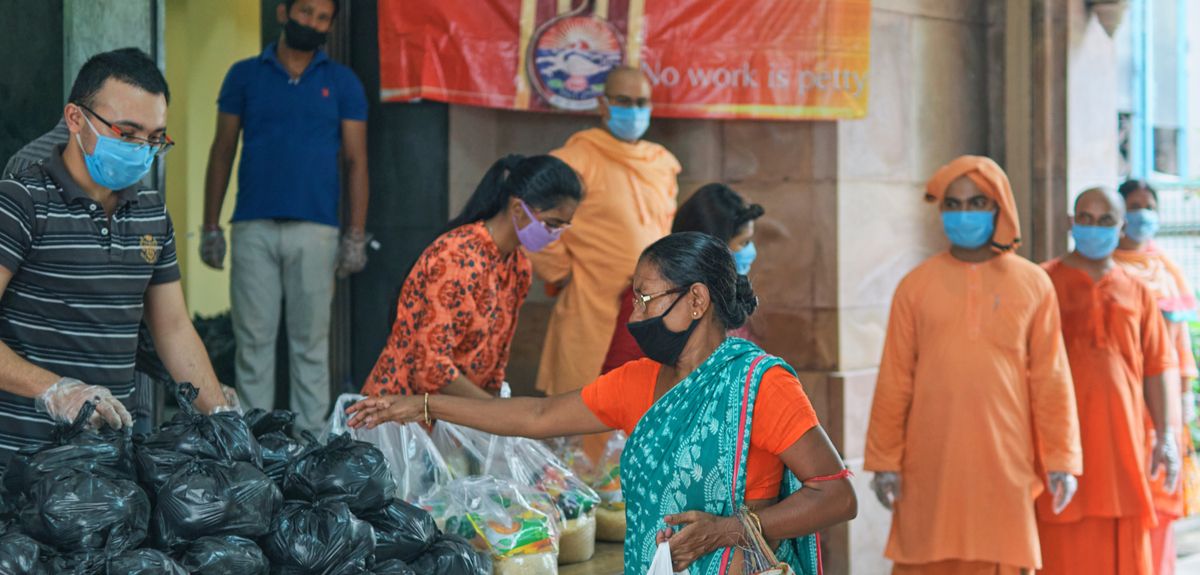

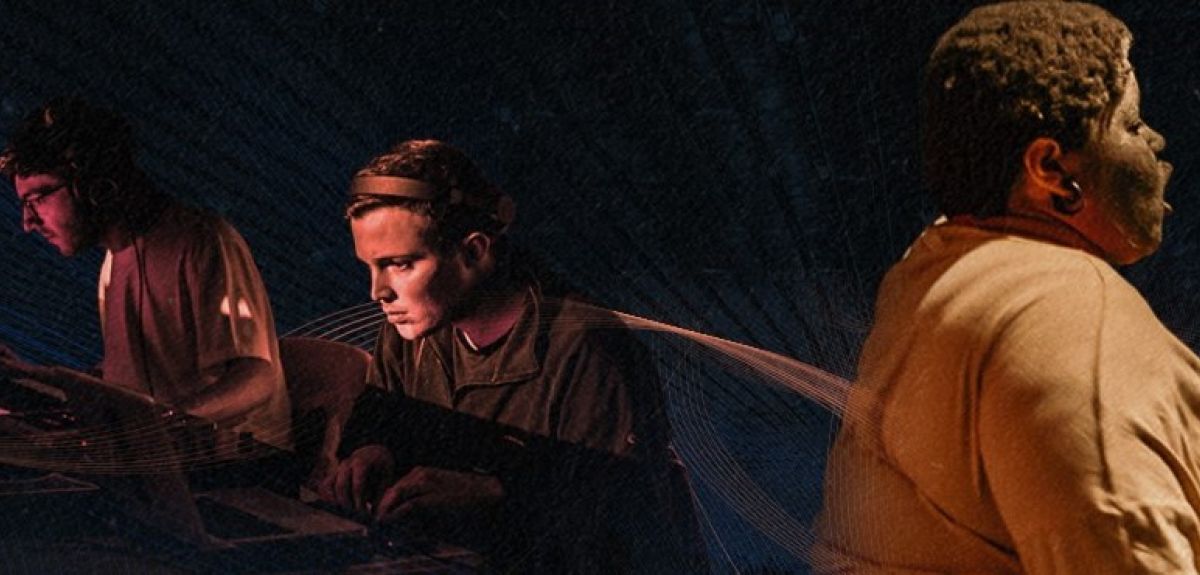
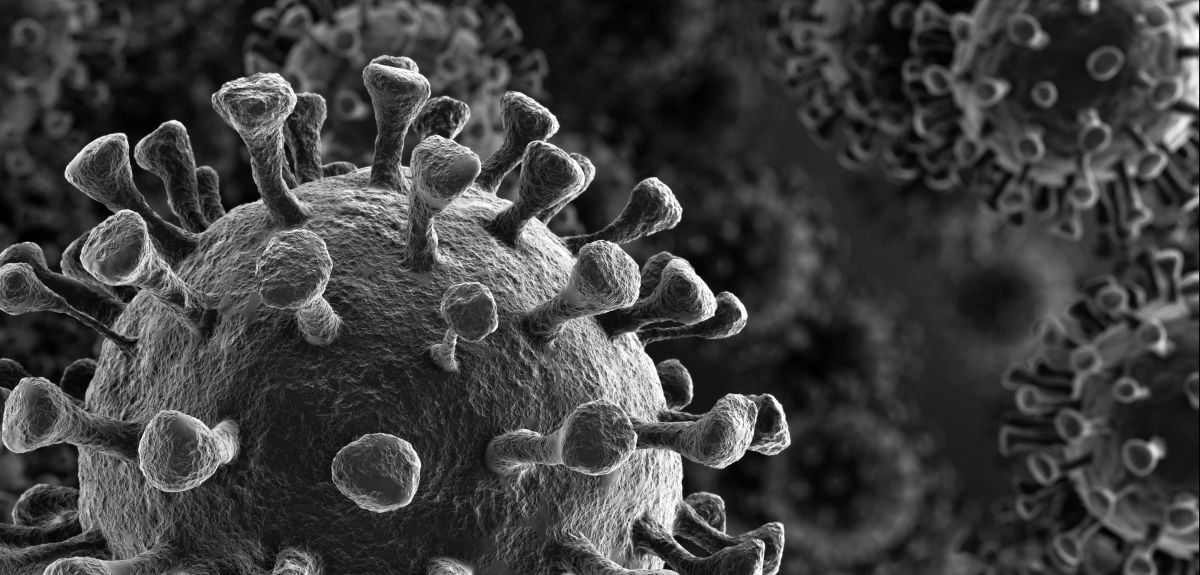

 The Oxford students at the forefront of the fight against microbial resistance
The Oxford students at the forefront of the fight against microbial resistance  The hidden cost of AI: In conversation with Professor Mark Graham
The hidden cost of AI: In conversation with Professor Mark Graham  Astrophoria Foundation Year: Dr Jo Begbie reflects on the programme’s first year
Astrophoria Foundation Year: Dr Jo Begbie reflects on the programme’s first year World Malaria Day 2024: an interview with Professor Philippe Guerin
World Malaria Day 2024: an interview with Professor Philippe Guerin From health policies to clinical practice, research on mental and brain health influences many areas of public life
From health policies to clinical practice, research on mental and brain health influences many areas of public life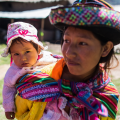 From research to action: How the Young Lives project is helping to protect girls from child marriage
From research to action: How the Young Lives project is helping to protect girls from child marriage  Can we truly align AI with human values? - Q&A with Brian Christian
Can we truly align AI with human values? - Q&A with Brian Christian  Entering the quantum era
Entering the quantum era Can AI be a force for inclusion?
Can AI be a force for inclusion?